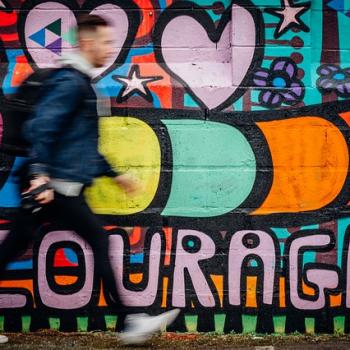This is Day 25 of the 2017 #30Days30Writers Ramadan series – June 20, 2017
By Inas Younis
The sacred can be hard to grasp. Every Ramadan we are encouraged to retreat into a spiritual sanctum for cleansing, ritual and prayer. We are called to turn to God and turn away from the ingrained patterns of thinking and behavior that have kept us from him.
Ramadan is an opportunity to manufacture the circumstances that can facilitate our spiritual growth. It can help us to appreciate the higher meaning inherent in every mundane act, to romanticize through ritual the most practical procedures of life. Met with genuine devotion and a proper attitude, Ramadan can have a transformative effect on our lives.
But what if, despite all our efforts, we remain untouched? What if, after removing the pollution of a mind obsessed with everything but God, we are left feeling nothing but empty and depressed? Lofty spiritual aspirations and the pressure to feel something more than hunger and thirst can sometimes backfire, leading to feelings of religious inadequacy.
What it takes to induce spiritual serenity or just a more metaphysical orientation is different for everyone. For some, sleepless nights spent in prayer will have its intended effect. Others have been conditioned by life to require a bit more trauma.
The hardships we choose are nothing compared to the ones we inherit or that are hoisted upon us by circumstances beyond our control. For those who have lived or are currently living in already excruciating circumstances, voluntary hardships and spiritual disciplines can feel like overkill.
Let’s be honest, the dominant emotion during Ramadan is not always peace and silent resignation but anger and despair.
Emotions that we might typically escape through indulgence in the trivial, social and sexual are no longer available to us during this month. We must deal with those emotions, good or bad, by facing them. We can only hope, with no guarantee, that the lack of an escape valve during this holy time will ultimately yield to surrender, peace, and a letting go.
Deprivation must lead to despair before it can lead to our deliverance.
In other words, Ramadan is not always a peaceful experience and, to be fair to ourselves and to the process, we should acknowledge that. We are told that it’s a time to count your blessings but for some it’s a time when the absence of love and security is felt that much more heavily.
Ramadan, like all occasions so seriously loaded with expectations and spiritual connotations, can become a reminder of all that is missing in our lives. Whether it’s a deceased loved one, healthy children, or a lack of resources, Ramadan can become the reminder that in spite of our best efforts the numinous remains too obscure to penetrate hearts hardened by difficulties.
Ramadan is a trial for reasons that go far beyond the deprivation of food and water. It’s a trial because it strips us of the amnesia we crave and forces us into a vibrant conscious space. It removes our traditional coping mechanisms so we are forced to cope in ways more befitting our status as spiritual beings.
God-consciousness is not always met with ecstasy. It can also be experienced as a kind of panic that makes us want to turn and run towards the more accessible resources we understand — the intravenous fluids of instant gratification and relief.
We are compelled by the occasion to pray and fast and remain humble at a time when we might feel we need the strength that only being self-possessed and proud can afford us. The hardship is in having to restrain our own power because our physical deprivation acts as the reminder that real power — true power — is found not in exertion, but surrender.
To me, facing this fact is the true challenge of Ramadan.
To avoid these psychological pitfalls, it is important to inject as much ceremony and routine as possible in an otherwise unceremonious, random, chaotic and sometimes grueling modern existence. No longer connected to the rhythms of the natural world or in some cases a normal one, we must consciously connect, not just to the pain but to some of life’s forgotten pleasures.
Ultimately serenity comes by praying for patience without demanding it right here and now.
Inas Younis is a freelance journalist and commentator. Her opinion pieces and personal essays have been published in various magazines and websites. Inas serves on the board of the Sisterhood of Salaam Shalom. She is also a contributor to a forthcoming 400-page community-led guide, aimed at mobilizing Muslims to take a stand against violent extremism and develop narratives of peace.













